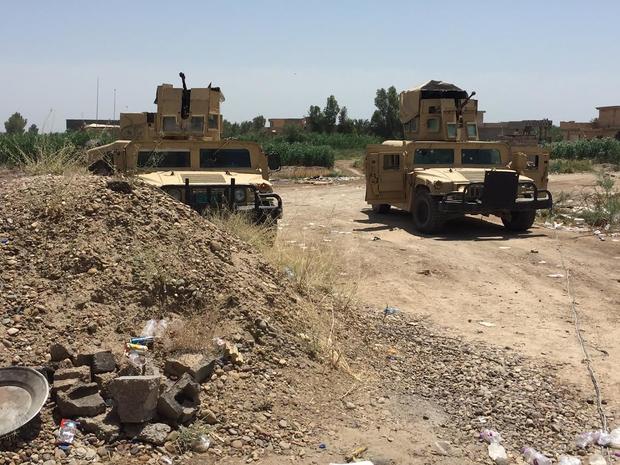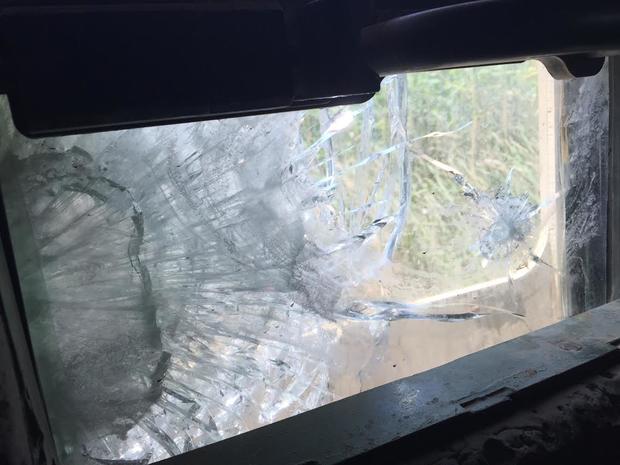Reporter's notebook: Alongside Iraqi forces fighting ISIS
BAGHDAD - We all knew it was just a matter of time.
The longer you stay in Baghdad, the more likely a massive car bomb is going to strike a part of the capital. It happens with sickening regularity. Most attacks go unreported, unless the civilian casualties start climbing into the dozens.
That was the case when a truck packed with explosives blew up in a crowded market place in Sadr City, the predominantly Shiite neighborhood in northeast Baghdad.
Rescuers were still searching for bodies when ISIS claimed responsibility, saying the bombing targeted a gathering of Shiite militias. But the attack, around 10 a.m. local time, on a crowded street, was clearly aimed at inflicting as many civilian casualties as possible.
With its jammed neighborhoods, policed by Shiite militias, Sadr City is often the choice target of the Sunni extremist group intent on killing Shiites, underlying the government's inability to do anything to stop them.
We went to Sadr City ourselves a few days before the bombing, and all the danger spots we know to avoid were unavoidable. Once we managed to get past the Iraqi police and army checkpoints, we came to checkpoints manned by Shiite forces that ring the area - an obvious target. Those checkpoints cause pinch points of snarled traffic - another obvious target. The marketplaces were teeming with people - yet again an obvious target. They were all there, and so were we.
It's also the stronghold of Shiite cleric Moqtada al Sadr.
U.S. forces fought and died battling al Sadr's forces at the height of the insurgency in 2004, and anti-American sentiment still runs high amid the squalor of the crumbling buildings and trash-strewn streets.
It would be too simplistic to say the bombing in Sadr City is the result of the losses ISIS is suffering on the battlefield; there were plenty of attacks on Shiite neighborhoods before that.
But it came as Iraqi forces, backed up by U.S. airstrikes, have begun making significant gains in Anbar Province, just west of Baghdad.
Yet there is one city that remains in ISIS hands and in striking distance for militants launching terror attacks in the capital.
On a good day you can get to Fallujah in just over half an hour.
But it hasn't been a good day in Fallujah for years, and it got considerably worse after ISIS toppled the city more than two years ago.
Getting to the embattled city that remains firmly under ISIS control meant getting out of Baghdad first, past checkpoint after checkpoint.
It's not something you can do without an escort. Significant security risks aside, Iraqi forces aren't about to let Western journalists pass into the no-man's land on the stretch of highway that leads to Fallujah.
The offer of an escort came from the al Sadr's security forces. During the insurgency against U.S. troops, they were known as the Mahdi Army. Now those same fighters, rebranded as Peace Companies, have been mobilized in the fight against ISIS.
Flanked by two Chevy Silverado pick-up trucks ("Heavy-Duty Strength for the Most High-Intensity Jobs") rigged with heavy machine guns, we headed west, looking like something out of Mad Max.
There we met up with Iraqi government forces who have fought ISIS to a standstill.
We loaded up into the beat-up and bullet-ridden Humvees provided by the U.S. and began driving through tall reeds along the front line. For a time, we lost the lead vehicle in the dust and almost took a wrong turn. And a wrong turn on the line skirting along ISIS territory could be the last for the young Iraqi soldier driving, and us.
Close up, it's not much of a front line at all. The soldiers had taken up positions in abandoned homes and buildings flattened by U.S.-led airstrikes or blown up by retreating ISIS fighters.
That would have been fine if this was an advancing force; you take your defensive positions where you find them. But this was a stagnant front line, a standoff that's barely budged an inch in a year.
We wondered what American military advisers would think of the Iraqi troops they trained. Where were the bunkers? Or the ditch to stop advancing suicide car bombs?
We were warned to keep our heads down, that we were in easy range of sniper fire. The soldiers had their weapons pointed toward a group of buildings lined by palm trees. It was there, we were told, that ISIS militants were holed up.
We didn't see any movement, on either side of that front line.


